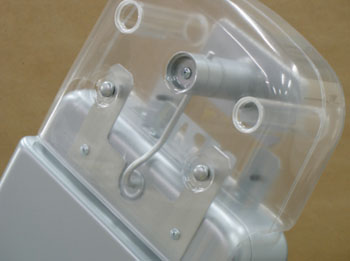Insertable Monitors Superior in Detecting Cardiac Arrhythmia
By HospiMedica International staff writers
Posted on 08 Jul 2014
A new study concludes that insertable cardiac monitors (ICMs) detect atrial fibrillation (AF) in stroke patients better than standard care. Posted on 08 Jul 2014
Researchers at Campus Bio-Medico University (Rome, Italy), Klinikum Coburg (Coburg, Germany), and other institutions conducted a randomized, controlled study of 441 patients (40 years of age or older) to assess whether long-term monitoring with an ICM is more effective than conventional follow-up (control) for detecting AF in patients with cryptogenic stroke. Patients with no evidence of AF during at least 24 hours of electrocardiogram (ECG) monitoring underwent randomization within 90 days after the index event. The primary end point was the time to first detection of AF within six months.

Image: The Medtronic Reveal XT ICM (Photo courtesy of Medtronic).
The results showed that by six months, AF had been detected in 8.9% of patients in the ICM group, versus just 1.4% of patients in the control group, representing a 6.4 times benefit. In addition, the researchers found that compared to standard care—including ECGs, Holter monitors, and other short-term diagnostic tests—the ICM detected AF in 7.3 times more patients at 12 months, and 8.8 times more at 36 months. When followed for 36 months, 30% of the patients in the ICM arm had AF detected. The study was published on June 26, 2014, in the New England Journal of Medicine (NEJM).
“If we can pinpoint the cause of stroke, we then can apply the most appropriate treatment. As AF is often intermittent and asymptomatic, we can't rely on symptoms to decide who has AF or who needs ECG monitoring,” said study coauthor Prof. Johannes Brachmann, MD, chief of cardiology at Klinikum Coburg. “Continuous monitoring of the heart rhythm can help us find those stroke patients whose AF is often missed with short-term monitoring. This can be explained by the amount of time that passes between episodes.”
For the study, the researchers used the Medtronic (Minneapolis, MN, USA) Reveal XT ICM, a comprehensive arrhythmia monitoring solution that automatically classifies rhythm types (atrial tachyarrhythmia/atrial fibrillation (AT/AF), ventricular tachyarrhythmia (VT), bradyarrhythmias, and more). The device helps monitors AT/AF burden to assess whether medical treatment is necessary or should be adjusted, as well as monitoring VT rhythm during atrial arrhythmias to assess the efficacy of rate control therapy.
The Reveal XT ICM has recently been superseded by the Reveal LINQ ICM system, which is approximately one-third the size of a standard AAA battery, and is placed just beneath the skin through a small incision of less than 1 cm in the upper left side of the chest.
Related Links:
Campus Bio-Medico University
Klinikum Coburg
HospiMedica Miniature Implantable Device Monitor article














